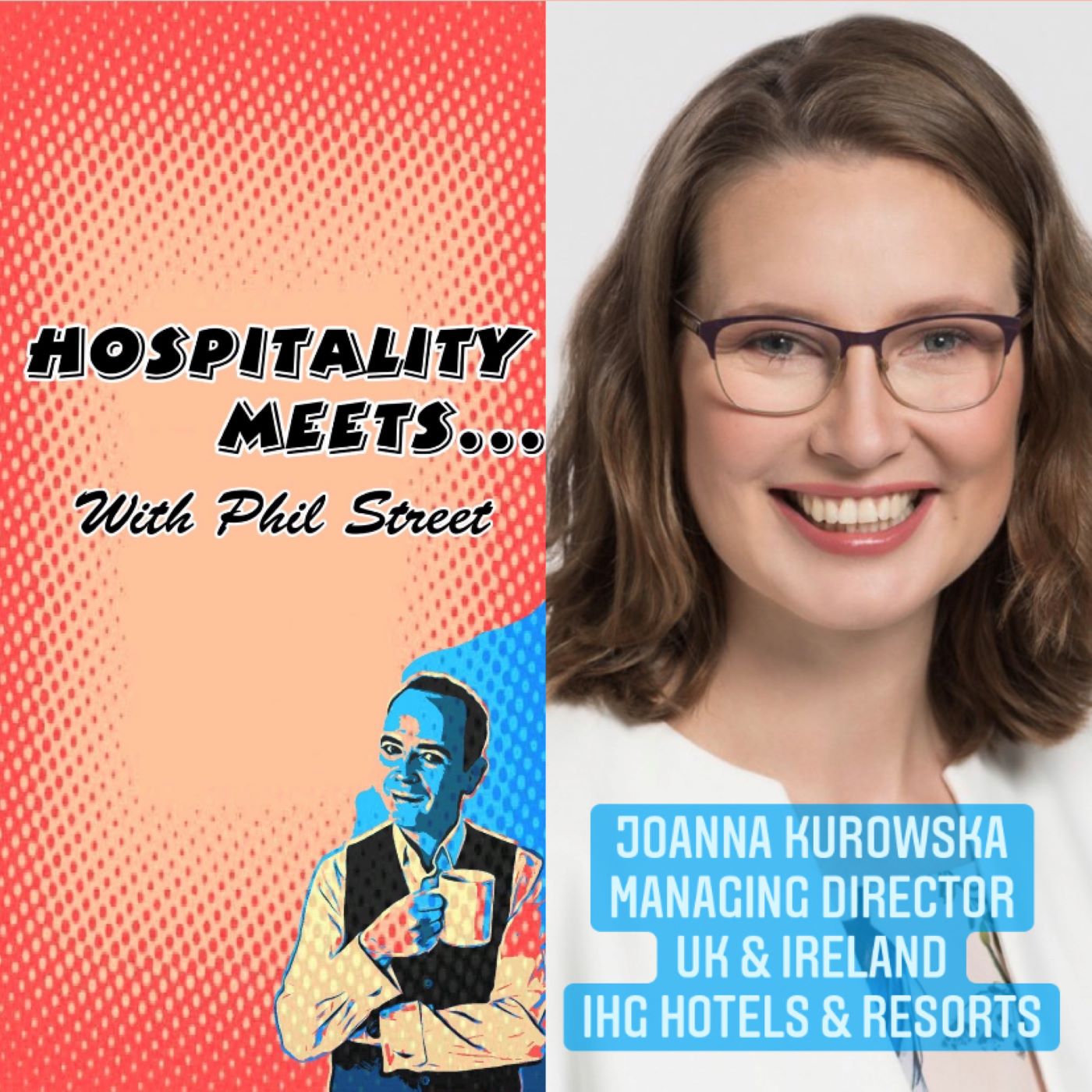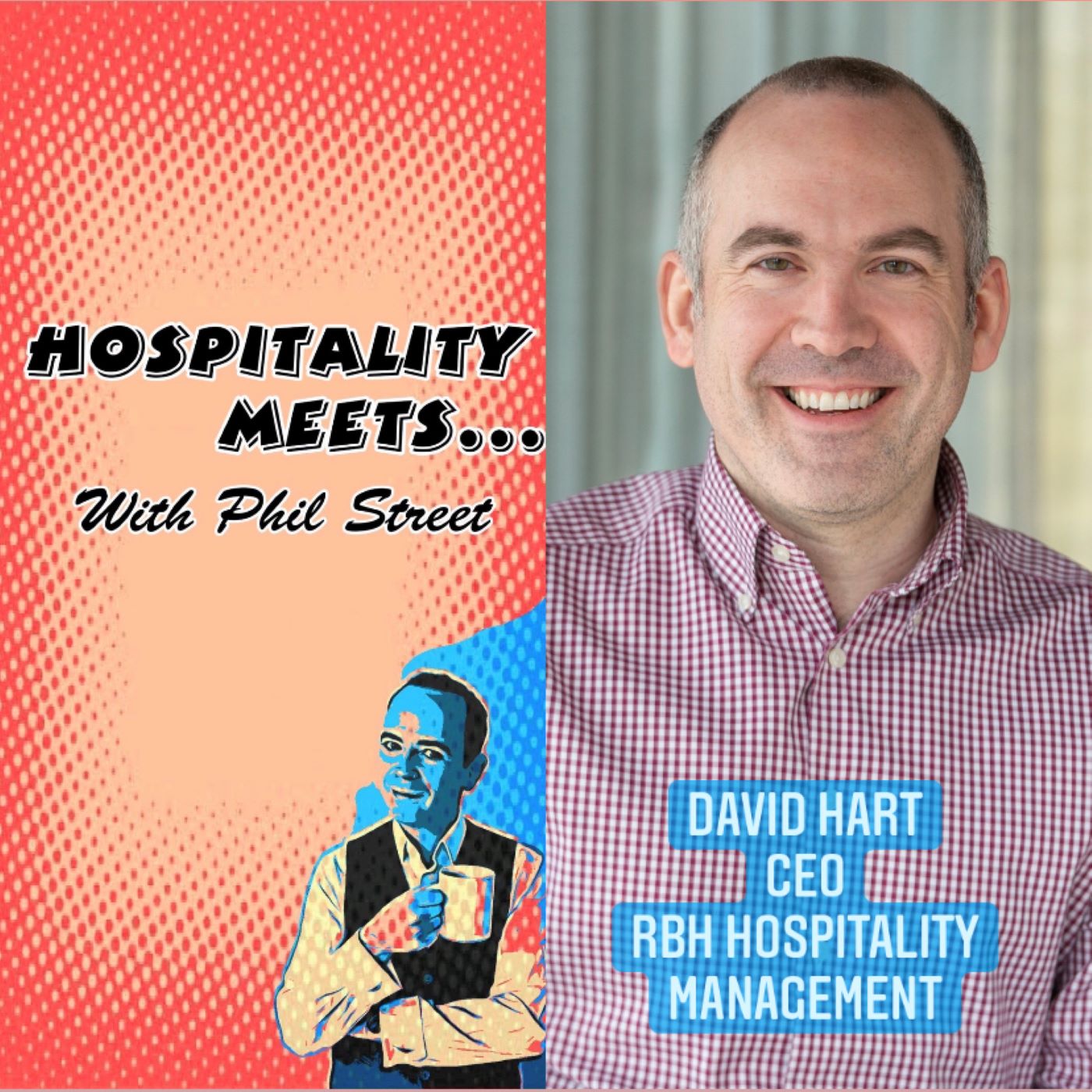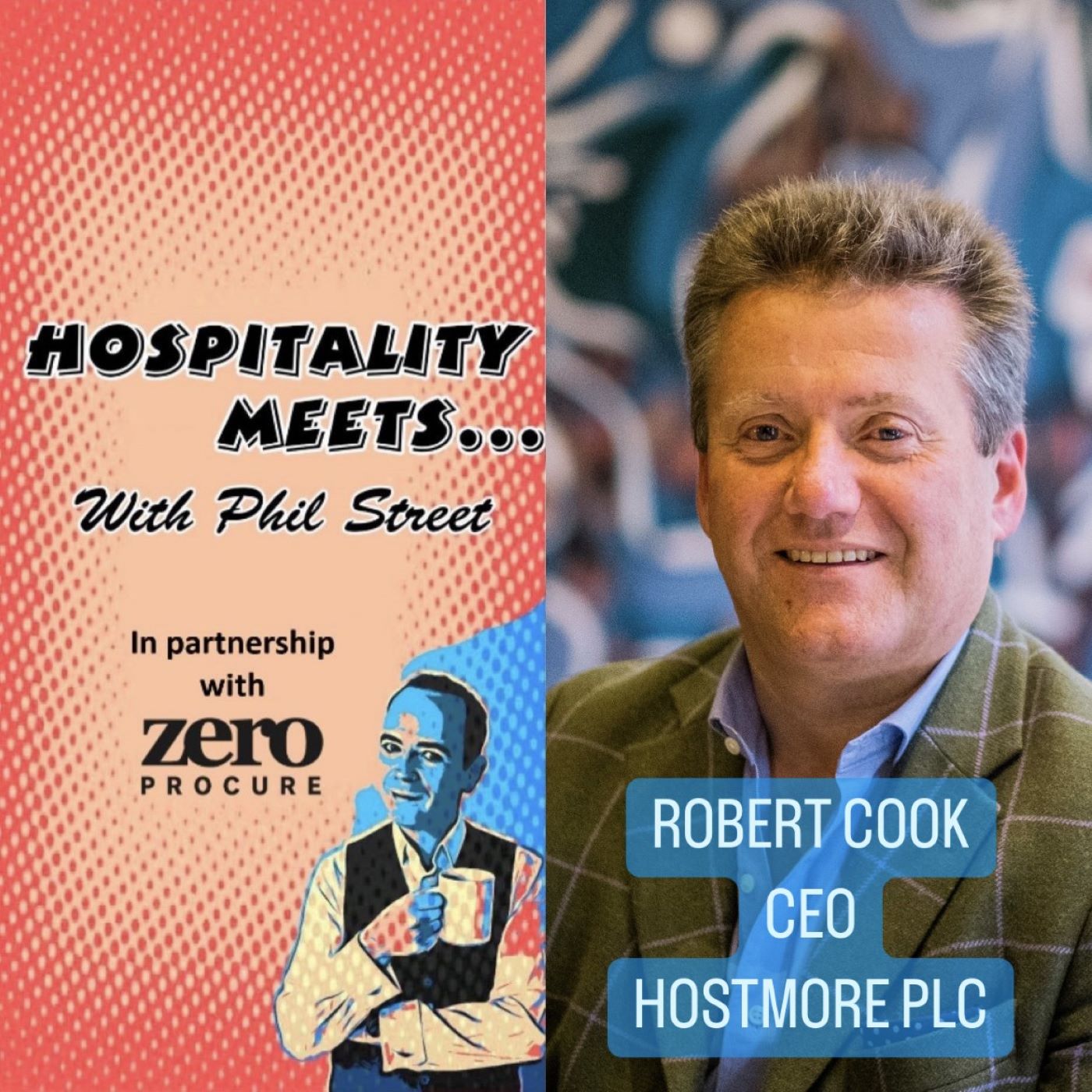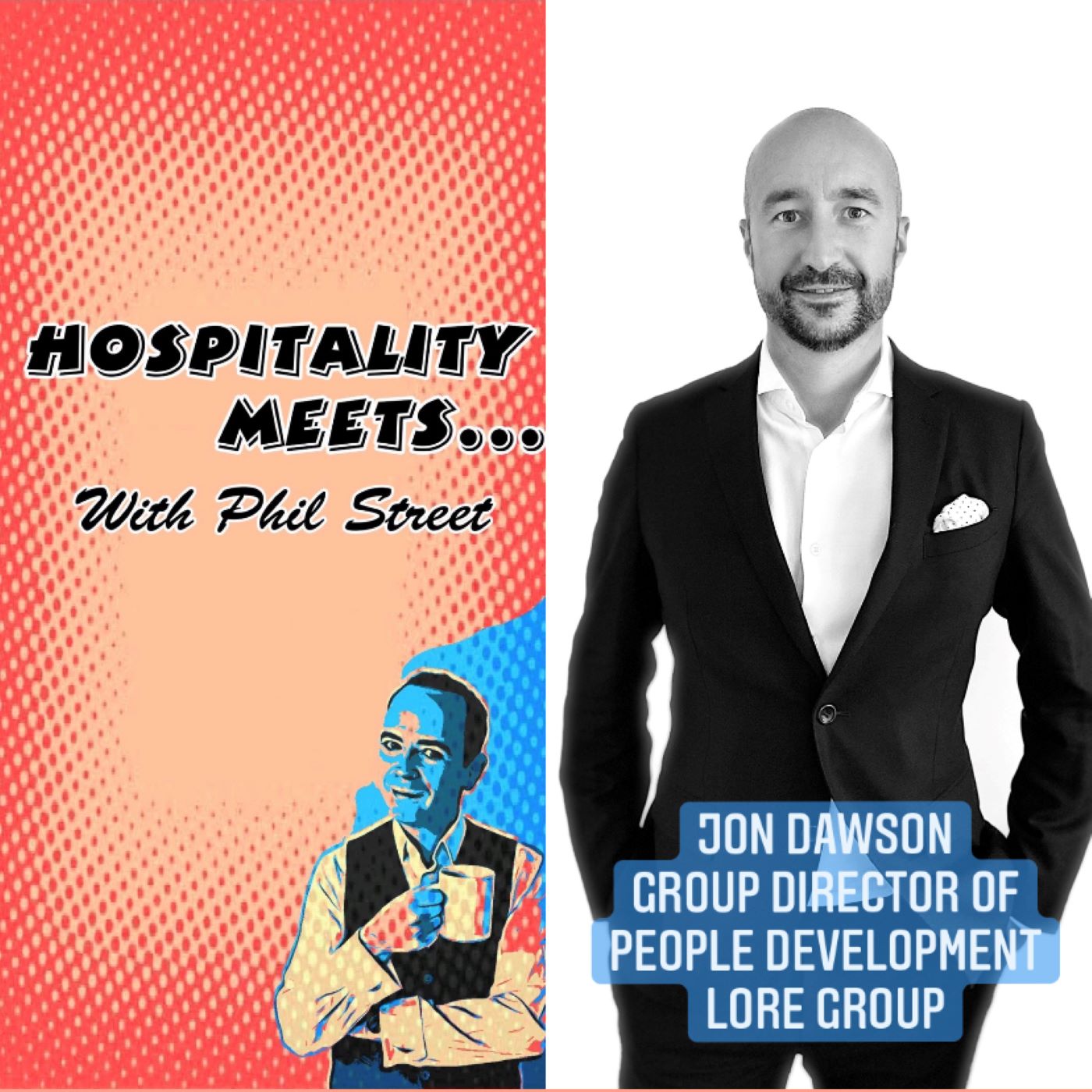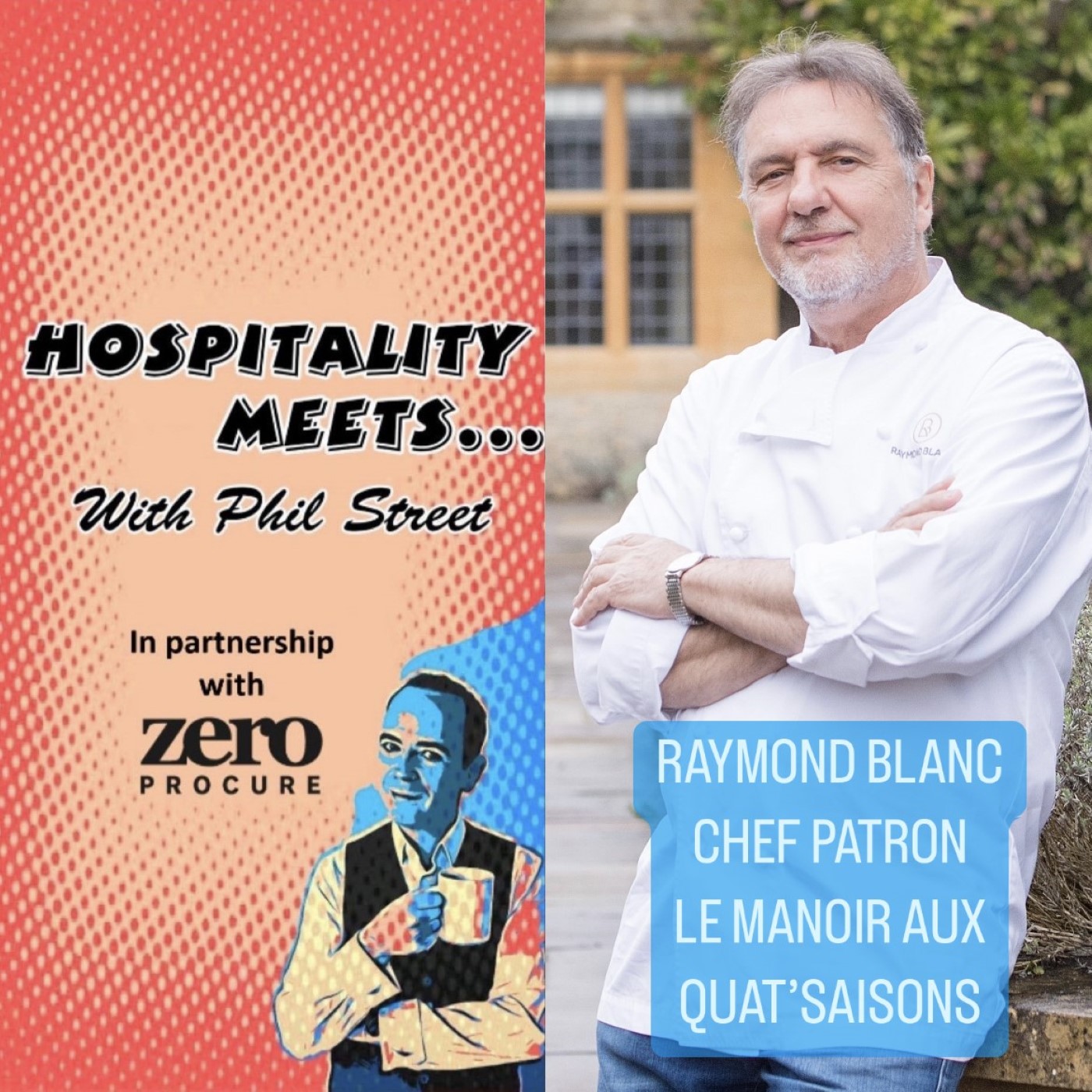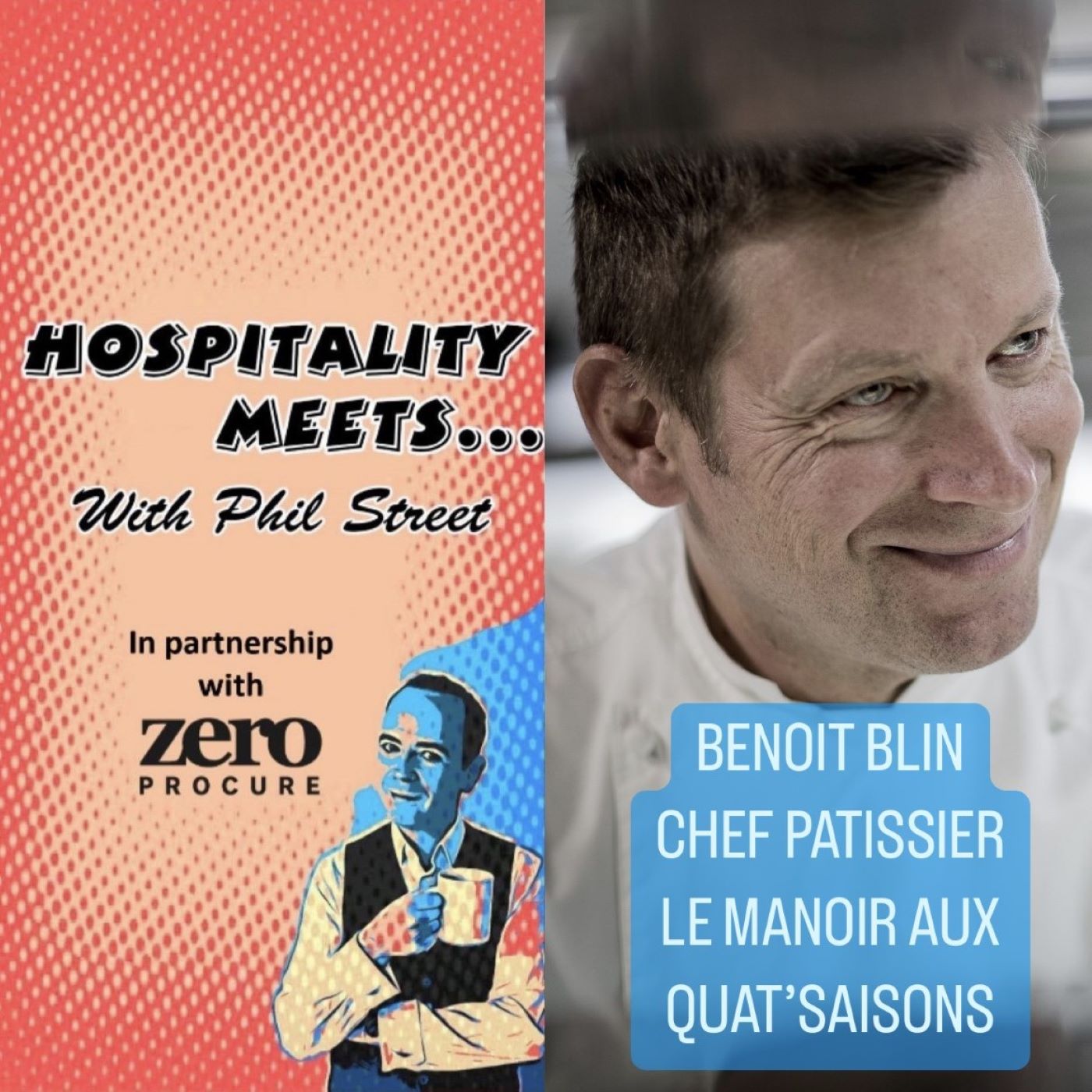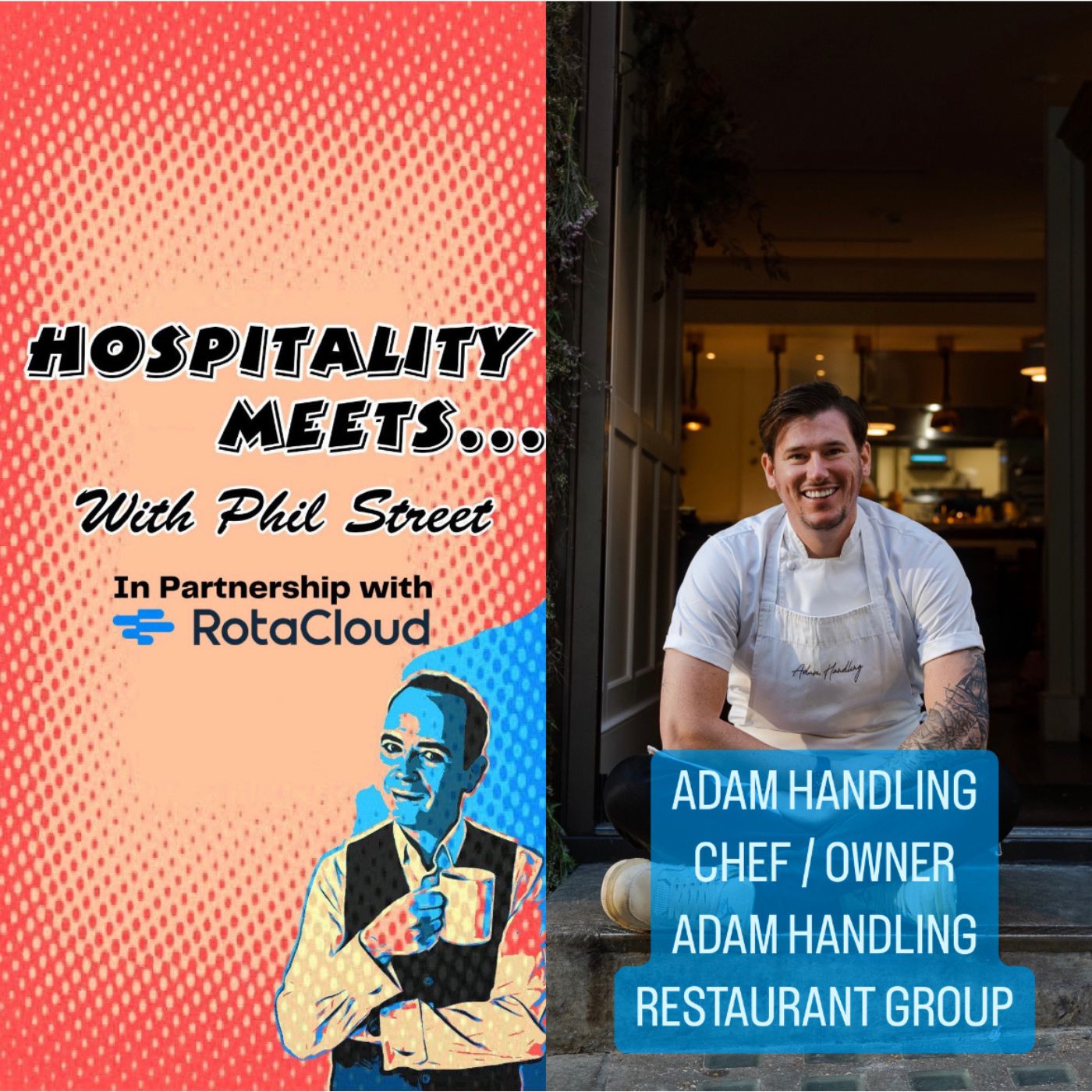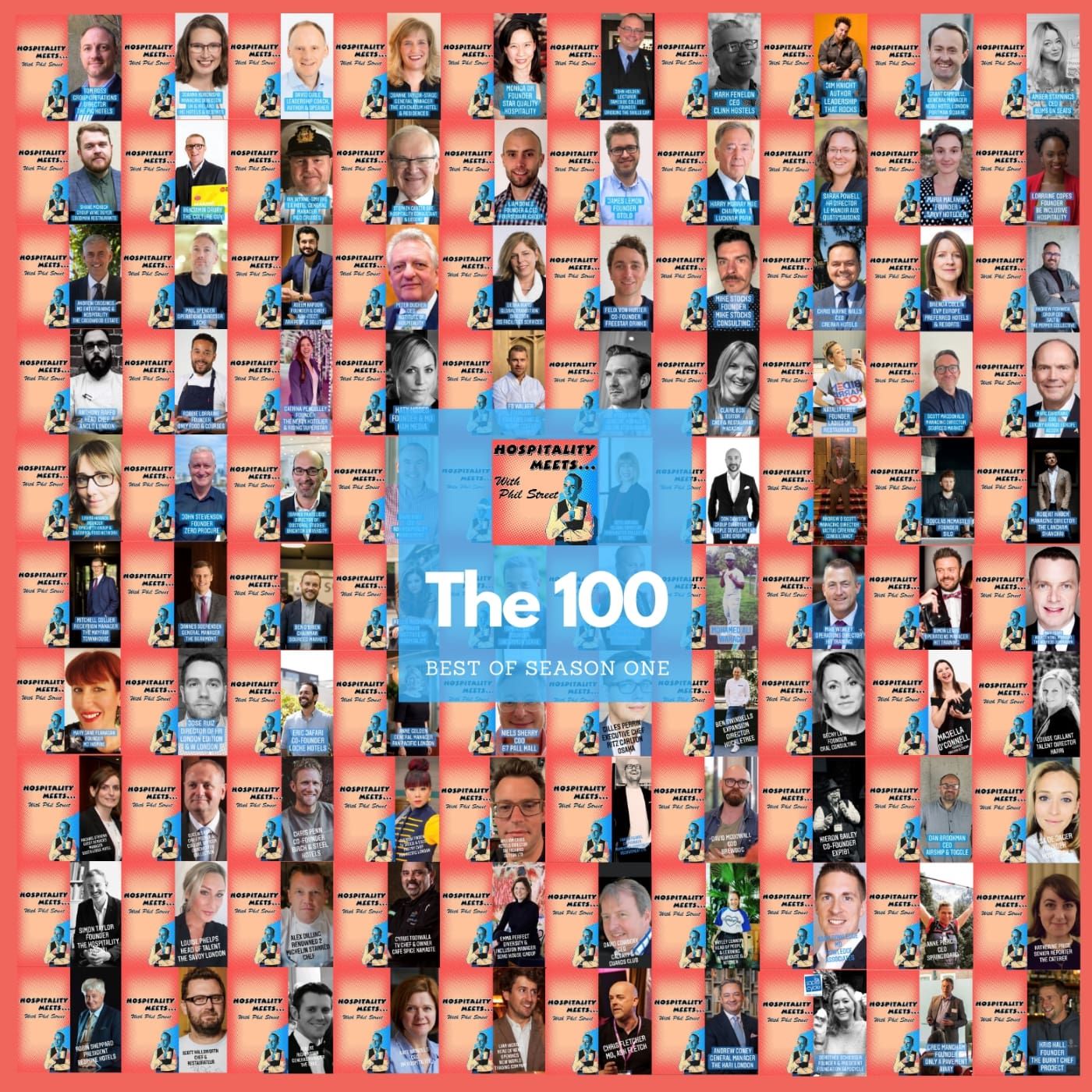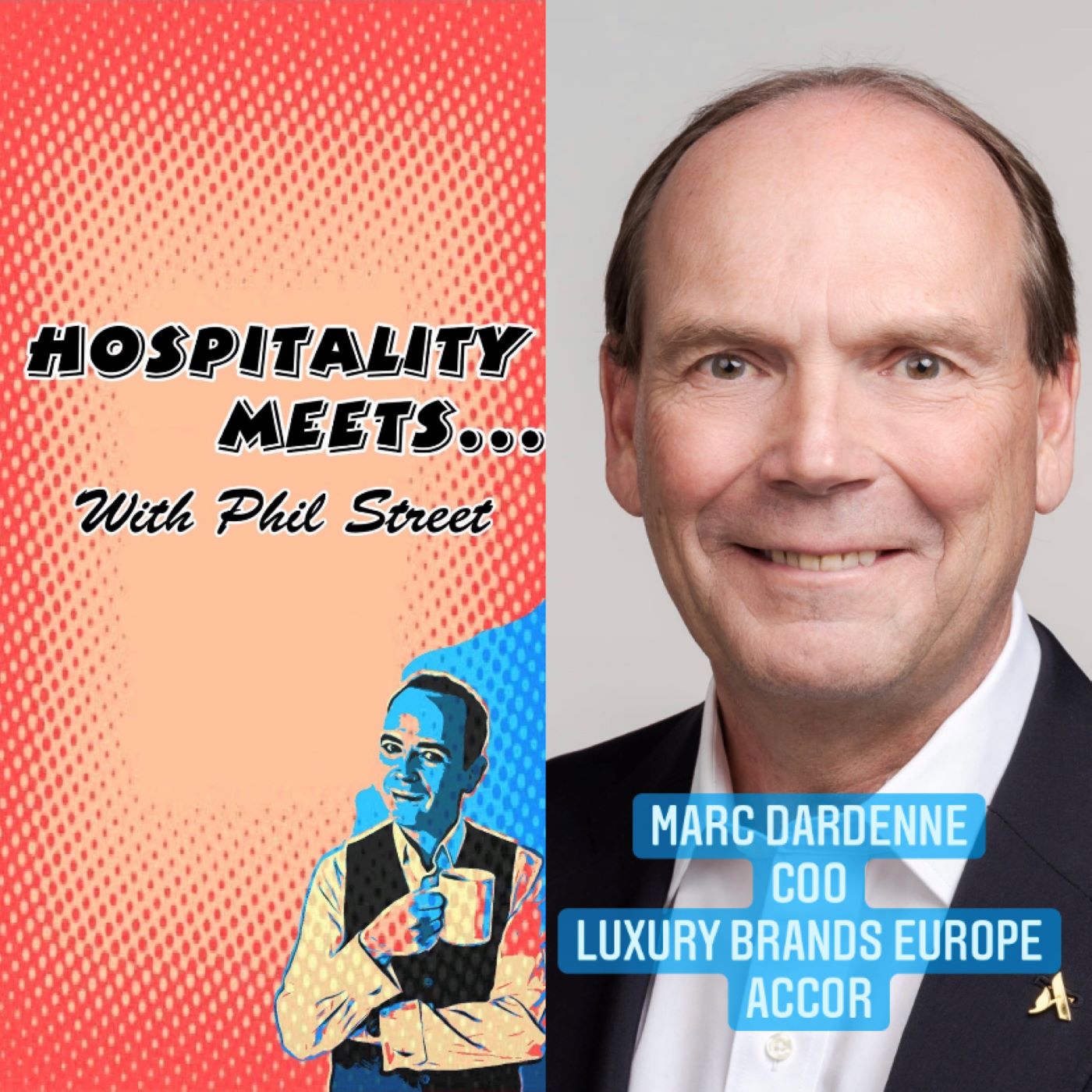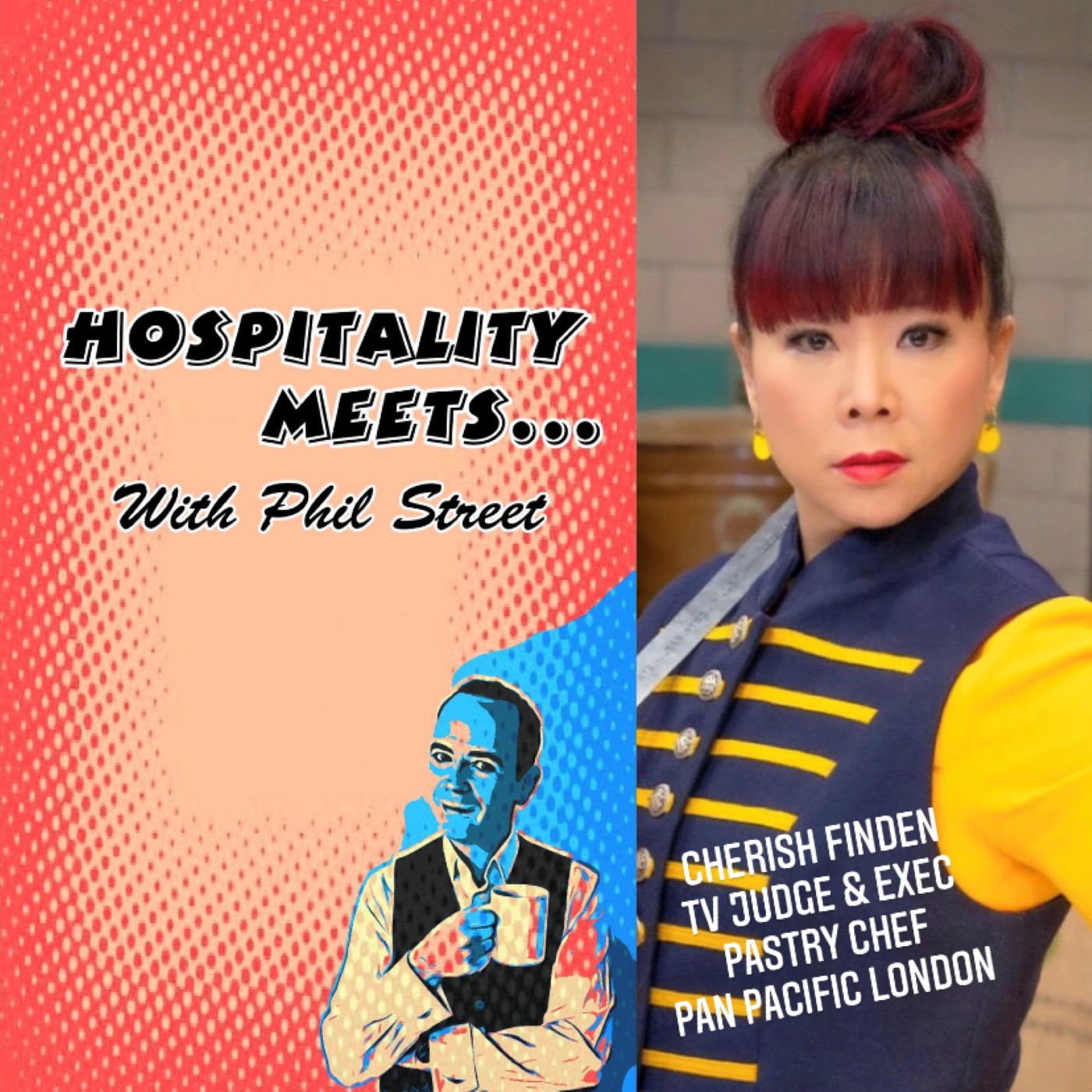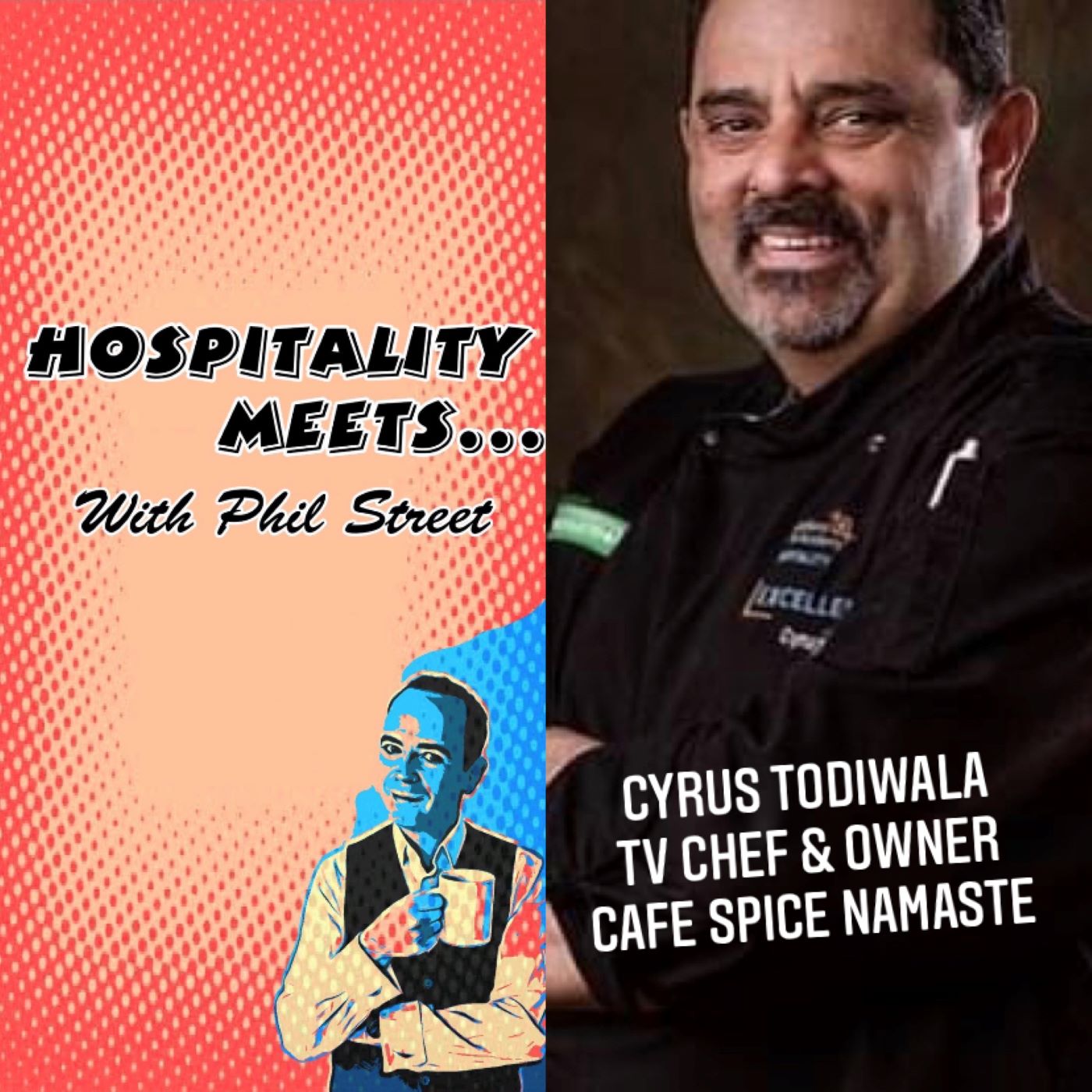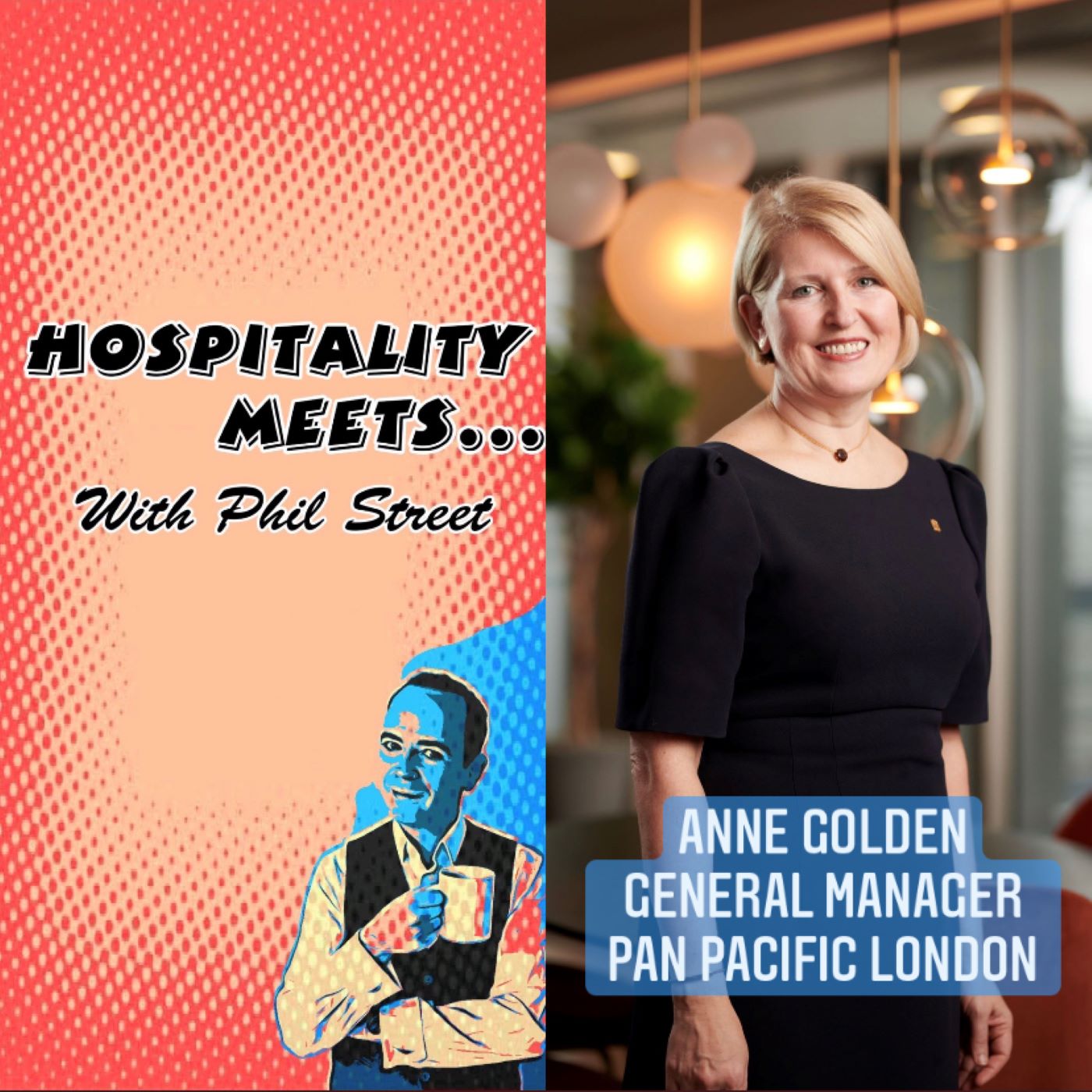#194 - Hospitality Meets Andrew Evers - IT (Tech) Adventures and Hospitality Hijinks

In the latest episode, Phil brings you an engaging and humour-infused conversation with Andrew Evers, the charismatic Group Director of IT for Rocco Forte Hotels. Grab your popcorn and settle in for an entertaining journey through technology mishaps, personal growth, and the evolving role of IT in hospitality.
Key Highlights:
1. Telephone Tales: Andrew welcomes Phil to the iconic Alexander Graham Bell suite at Brown's Hotel in London. Did you know this suite is named after the first telephone call made from (or to) the hotel? Imagine the chaos if they had mis plugged cables back then!
2. IT – Not Just Fixers Anymore: Andrew shares how the so-called IT department has metamorphosed into the all-encompassing technology team, interfacing directly with guests to enhance their experiences. Fixing glitches? That’s old news—we talk about making systems sing!
3. Cable Catastrophes and Overcoming IT Challenges: Enjoy a good laugh with Andrew as he recounts a technical issue involving a misplugged cable. Spoiler: the secret to resolving it is humour and a cool head. Think your IT issues were bad? Think again!
4. The Evolution of an Extroverted Techie: Busting the stereotype of the introverted IT guy, Andrew reflects on his journey from an ultra-social kid fascinated by technology to becoming the IT leader of a luxury hotel brand. No university? No problem! Perseverance, passion, and the knack for self-paced learning worked wonders.
5. Mid-Show Fun: Phil introduces the classic IT term “ID ten T error," which humorously spells out "idiot," bringing light-hearted banter and relatable chuckles. Ever heard of a "problem between the keyboard and the monitor"? The duo laughs over common IT troubleshooting clichés.
6. Balancing Old Charm with New Tech: Step into the architectural maze Andrew navigates while updating technology in historical hotels. How do you modernise without losing the charm? One careful step (and wire) at a time.
7. From Waste to Wonders: In a surprising career detour, Andrew briefly strayed into the world of waste management. Missing the chaos and creativity of hospitality, he eventually returned to where he belonged. Expect some quirky insights and real talk about finding one’s true calling.
8. Passion Over Papers: Andrew's story is a testament to rising through the ranks without formal qualifications. Phil lauds his achievements, and Andrew emphasises that passion and perseverance can trump traditional credentials—take notes, aspiring techies and hoteliers!
9. Crisis Management with Kindness: Andrew doesn’t shy away from discussing the difficult decisions he had to make during crises. His mantra was simple: protect your team and treat everyone with respect, even when the problems seem insurmountable.
10. Closing with Camaraderie: Both Phil and Andrew express their excitement for future advancements and growth. With shared hopes and laughs, this episode wraps up on a note of inspiration and camaraderie.
Whether you’re a technology enthusiast, hospitality professional, or a fan of amusing anecdotes, this episode brims with wit and wisdom. Tune in for a hearty mix of humour, heartfelt stories, and valuable insights straight from the trenches (and server rooms) of hospitality IT.
Subscribe, rate, and review to stay updated on more such engaging episodes!
The Guest
Andrew Evers works for Rocco Forte Hotels as their director of IT. He has worked in technology for 27 years and alongside hospitality since 2011.
Instagram - @technically_andy
LinkedIn - https://www.linkedin.com/in/andrew-evers-7087307
The Sponsor
Today’s episode comes to you in partnership with RotaCloud, the people management platform for shift-based teams.
RotaCloud lets managers create and share rotas, record attendance, and manage annual leave in minutes — all from a single, web-based app.
It makes work simple for your team, too, allowing them to check their rotas, request holiday, and even pick up extra shifts straight from their phones.
Try RotaCloud’s time-saving tools today by heading to https://rotacloud.com/phil
This podcast uses the following third-party services for analysis:
Podcorn - https://podcorn.com/privacy
Andrew Evers [00:00:00]:
Hello.
Phil [00:00:00]:
Huge hospitality meets welcome to Andrew or Andy Evers.
Andrew Evers [00:00:05]:
Hello. Welcome.
Phil [00:00:05]:
How are you?
Andrew Evers [00:00:06]:
I'm doing great, Phil, thank you very much for having me on. Welcome to Brown's Hotel.
Phil [00:00:09]:
Yes, indeed. Well, you said welcome, indeed. Welcome to the show, but it's. Welcome to your hotel. It is, yes, yes. So I suppose, describe where we are.
Andrew Evers [00:00:17]:
So we are in the Alexander Graham Bell suite here at Brown's Hotel in Albemarle street in Mayfair in central London. And this is called the Alexander Graham Bell suite.
Phil [00:00:26]:
The cars.
Andrew Evers [00:00:26]:
The very first telephone call was placed from this hotel. So there we are. Placed from this hotel or made to this hotel. I forget the specifics.
Phil [00:00:34]:
Right.
Andrew Evers [00:00:34]:
I think you probably get a different answer depending on who you ask.
Phil [00:00:36]:
Right. Back in the analogue days, do you remember them?
Andrew Evers [00:00:40]:
Just about. I'm trying to forget.
Phil [00:00:42]:
Aren't we all? Well, yeah, I suppose that probably has more relevance to you than the vast majority of guests I have on this show, but, yeah, tell the world what you do.
Andrew Evers [00:00:50]:
So I'm the group there, I'll start that one again.
Phil [00:00:53]:
There we are.
Andrew Evers [00:00:54]:
Just been in for two minutes. I've already made a mistake, so sorry.
Phil [00:00:56]:
I'm not edited the.
Andrew Evers [00:00:57]:
Yeah, fine, fine. I'm the group director of it for Rocco Forte Hotels. Been with the company for quite literally two years, this week, in fact. So it's been a hell of a journey already. It's a pretty big brand, it's a pretty big responsibility to carry that as well on behalf of the Forte family and it's an absolutely huge honour. Just things are going great. Really happy here.
Phil [00:01:16]:
Nice, nice, nice. Yeah. Well, and I thank you because you reached out to me about the prospect of coming on the show and this was actually one of the objectives when I started the podcast was to showcase all of the different things that you can do in hospitality. And obviously it, in all of its forms that exist these days, is such a crucial part to any hospitality business.
Andrew Evers [00:01:39]:
Oh, right, yeah. And I think I feel very honoured to be the first technology person that you've done. I suppose that's representative. A little bit of the sign of the times, perhaps the renaissance of the technology department. I'm sort of trying to change the verbiage away from it and more onto technology because we were just chatting before we started recording here. It used to be the case that the IT department was the below stairs team that fixed printers and replaced broken monitors and stuff. But these days we're actually putting our technology right into the hands of our guests and that's the way we see it. These days as well.
Andrew Evers [00:02:14]:
They are also our guests and we're using technology products to delight our guests and to sell services and so on and so on. So it's been a real. Yeah, Renaissance is probably the right word. It's sort of changed completely as a business unit and we're actually delivering real value into, directly into the hands and pockets of guests these days. So, yeah, your is a good point.
Phil [00:02:34]:
It's not really fit for purpose anymore. I mean, because that was information technology, right? That was the original word as to what it was. But actually you're dealing with a hell of a lot more than information.
Andrew Evers [00:02:44]:
That's true. And I suppose the IT department, again, when you say that out loud, I think of computers at desks and people typing on keyboards and stuff and. Yeah, there is that and there always will be. There still is that. But these days, if you say the word the technology department or technology team, it sounds like the IT department is a subset of that. So of course you've got technical support, you've got cables, you've got routers, you've got firewalls and all that stuff, and that's it. Great. We like that.
Andrew Evers [00:03:10]:
That's brilliant. But the technology team actually does a great deal more right up until, you know, we're interfacing directly with guests now. So we have to be. We have to be a part of the hospitality experience because. Well, we just are.
Phil [00:03:24]:
Yeah, yeah, absolutely. Well, here we are. We're laying it down now for the world to hear. Time for a change. Well, it's in the terminology.
Andrew Evers [00:03:31]:
Yeah, no, it really has. This thing has. It used to be the case that hotels were considered to be. Well, not just hotels, but hospitality generally speaking, were considered to be behind the rest of the business world in terms of technological awareness, investment, so on and so forth. But that has absolutely changed. And all of a sudden, within the space of about three to five years. Yeah, the hospitality industry has jumped up ten to 15 years in terms of progress, just to catch up with. With the rest.
Andrew Evers [00:04:03]:
It's really, really different now.
Phil [00:04:04]:
Yeah, yeah. Well, welcome to the party then, I suppose, for the industry.
Andrew Evers [00:04:07]:
Yeah, kind of, yeah, feels a bit like that, yeah.
Phil [00:04:09]:
And we'll talk about this, I think, in a lot more depth towards the later part of the journey because obviously we were talking again before we switched the microphone on about the rate of change, and there's obviously so many things that are headline making at the moment about the rate of change in tech. So I really do would love to pick your brains on that, but it's not the primary reason why we're here. We're here to talk about you and your life and your journey and all that very long five minutes ago. But yeah. So take us back to one, I suppose, how did you get into it? Or tech, sorry, as we now call it, and two, how did that then transmit into the world of hospitality?
Andrew Evers [00:04:44]:
Yeah, I guess I went to school at a time when it. Technology, yeah, sure it was there, but there wasn't really any. It was certainly not something that people used every day and it wasn't something that anybody had ever thought that there'd be not a real career in as such and there weren't courses available, there weren't those sort of things. And I went to school at a time when it was a prescribed method for everybody. You go through school, then leave school and you go to university and then after university you pick your vocation and so on. That method just didn't work for me and at the time there really weren't the alternatives that are available to people these days. So straight up, I was labelled as, well. Stupid, you're stupid.
Andrew Evers [00:05:23]:
I can't go to university. Well then I guess you should have them.
Phil [00:05:26]:
Things have changed a little bit, fortunately.
Andrew Evers [00:05:28]:
Yes, they have, yeah. So it was actually a friend of my mother's who was. She was a database administrator for a really big group of universities and she sort of introduced me to it and technology and the sort of engineering. I'm struggling to sort of understand what it was that just captured my fascination about this, this sort of machine thing that you tell it to do stuff and it does stuff in a very mathematical way and very logic based way. I suppose my brain just works in that sense. I was hooked. I just couldn't wait to get out of school and get into this thing.
Phil [00:06:02]:
I find that really interesting actually, because why wasn't school? I suppose because school and the way that the education system works is a kind of generalist education to, I suppose, give you a snapshot of lots of different things. You then find something that you go, oh, that's quite exciting, I'd quite like to do that, and away you go. So at the time that we're talking about, if you don't mind talking about ages and things like that, what era are we in?
Andrew Evers [00:06:28]:
We're talking about the sort of early to mid 1990s at the time.
Phil [00:06:31]:
Right, okay. Definitely.
Andrew Evers [00:06:32]:
It's just sort of emerging. But the courses weren't really mature and particularly before university level anyhow. A levels, GCSE's, forget about it. There just weren't those sort of opportunities, particularly through a public school system. So. And it was, as I was saying, it was a very prescribed method of education, which now we know that doesn't work for every person, for every brain, certainly. I just was never an academic person, and I found it really hard to engage. I just couldn't handle the sort of everyday discipline approach to schooling in that sense.
Andrew Evers [00:07:05]:
And I wanted to be doing it at my own pace, in my own way. And I guess I felt like a different person when I sat in front of the computer. It was sort of, nobody's telling me what to do or how to do it. Now I'm on my own terms, and this is just. I just suddenly felt right. This is exactly what I was supposed to be doing all along. And then that sort of in a very, I guess, nerdy, geeky, whatever's the right word, that just felt.
Phil [00:07:28]:
Your words. Your words, not mine. I have a brother in it, tech telephony. So I'm bored to tears half of my time when I'm talking to him.
Andrew Evers [00:07:36]:
Okay, well, if you want to go, if you want to nod off whilst I'm chatting, that's fine, too.
Phil [00:07:40]:
But, no, I suppose. Sorry, I jested that. And sorry to interrupt you, but I would also. This is kind of one of the reasons why I wanted you to come on the show, was to kind of bust some myths around that because, you know, it is kind of. It's. Once again, it's a stereotypical view that if you work in it, you know, you got to be a certain type of person, you behave in a different way, blah, blah, blah. All of these. And I'm just making all of these amazing, horrible assumptions about.
Phil [00:08:04]:
About that. But my experience, of course, I love my brother a bit. I've met many people within the world of it and tech. It's just, you know, I don't know where it came from, but we need to bust that myth.
Andrew Evers [00:08:15]:
Yeah, I guess. Like, for me. Yeah, sure. I get what you're saying. And I think I was always quite an extroverted kid, and I wanted to interface with people, and I wanted to be a part of the action. You know, I make no secret. I'm probably accused of being a show off from time to time. I like the spotlight.
Andrew Evers [00:08:30]:
It's true. You know, I might as well just say it like this. But there wasn't the. I just. I didn't have an outlet, if that makes sense, for that part of my personality. And you're right. Some of the funnest, coolest people have an interest in technology. I would say it's probably true, though, that technology, people's minds do tend to work in a certain way, but then you probably say that of any industry, expect the same is true for, you know, people who work in finance in a big way.
Andrew Evers [00:08:56]:
They're probably wired a certain way.
Phil [00:08:58]:
Without question. I think there has to be some kind of differential in the way that the brain joins up the dots. Right. Otherwise we'd all do the same thing. Just life would be incredibly boring.
Andrew Evers [00:09:07]:
Exactly.
Phil [00:09:08]:
Yeah.
Andrew Evers [00:09:08]:
So, yeah, I guess I just didn't have an outlet for that at the time.
Phil [00:09:11]:
Yep.
Andrew Evers [00:09:12]:
And then it just. My, my self discovery came when at long last, I can quit school and do this thing, which was kind of the side quest. Well, I'd kind of like to make that the main quest.
Phil [00:09:25]:
Yeah.
Andrew Evers [00:09:25]:
And as soon as I got the opportunity, I was straight into, no, I don't want to do a levels, I don't want to go to university. My parents were horrified. No, I'm going into technology. That's the thing for me. I know it. And just got a job with the local IT company and I just. I have never looked back. And at a time when me and my peers and I were sort of pushing 1819, they were all sort of worried about university, didn't have any money, couldn't find work, etcetera, etcetera.
Andrew Evers [00:09:52]:
I was employed, and I'd been employed for a couple of years already. I bought myself a cardinal and I could afford to put fuel in it.
Phil [00:09:59]:
Yeah, pay rent, get a mortgage.
Andrew Evers [00:10:01]:
And so at the time, I was sort of confused by, well, this isn't how I was told life was meant to go, but this is kind of working for me right now. And it just. I just never stopped from that point. It just never stopped. And it was from one IT company to another, one national field service in iT, computers, networks, etcetera. And I just kept going and going. And then the hospitality thing, I'm sure you're absolutely fed up of hearing this.
Phil [00:10:28]:
Fell into it, but it does.
Andrew Evers [00:10:29]:
I'm sure everybody that comes on your show will say the same thing.
Phil [00:10:32]:
Not everyone. I could count on one hand those who didn't. But yes, it is a recurring theme.
Andrew Evers [00:10:37]:
Without question, the people come into hospitality by accident, as opposed to intentionally. Yeah, yeah. My partner very much intended to get into hospitality, and that's indeed what she did for me. It wasn't intended at the time. I found myself working for a hotel company. At the time I was working for an it company. We happened to take a really big service contract for a hospitality company in London. And when you take the high pressure, intense life of it and technology services and combine that with the high pressure and intense life of luxury hospitality services, there you go.
Andrew Evers [00:11:14]:
There's my outlet. And it just. I guess I just like working under pressure. Yeah, right. And so, yeah, hospitality as an industry has been really quite good to me, and it wasn't intentional, but it's just, well, I guess I just found the spot.
Phil [00:11:29]:
But I suppose this is also part of maybe the overarching first part of your journey in terms of schooling. We've spoken many, many times on this show around the fact that people making kids and, you know, the future workforce aware of hospitality as a career in itself, it's just not something that's really done.
Andrew Evers [00:11:47]:
So true.
Phil [00:11:48]:
So you don't know what you don't know. Right. And you've gone into this thing that is beginning to make you sing and you've clicked with it and you didn't really know that this other industry existed.
Andrew Evers [00:12:00]:
Right.
Phil [00:12:01]:
Certainly from a perspective of the job that you might be able to do within that.
Andrew Evers [00:12:04]:
And interesting, you know, I was talking to a general manager about this some years ago and he commented, he said to me, do you remember back in the 1990s, the british army had a tv campaign about joining the army? And the whole campaign was about, if you join the army, you're not just a soldier with a machine gun in the field. There's telecoms, logistics, mechanics, education, something else. All of these things are army roles. Hospitality, exactly the same in hospitality. There are so many different career paths within the overall hospitality umbrella is really, really difficult to generalize. And I think there's just not an awareness. I think we're getting there. I think.
Andrew Evers [00:12:45]:
I think things are moving forward. From where I'm sitting, it's no longer the case, but I think it used to be. People say hospitality, they think, you know, they think a minimum wage job, something that's, that's no skills, no future, a job over the summertime, and then you'll leave and be on your way and forget all about it.
Phil [00:13:04]:
Go and get a proper job.
Andrew Evers [00:13:05]:
Exactly. Go and get a proper job. Exactly. You said it. That's exactly right. But these days, I think there is a realization and awareness that actually in hospitality, man, you can choose one of any number of paths and you can go as far as you want to go and there will be a career and a path for you if you want it to be a summer job. I mean, sure, you can do that if you really want to, but I don't think. I don't think anybody's looking at hospitality and laughing anymore.
Andrew Evers [00:13:30]:
I think maybe that was the case some time ago now.
Phil [00:13:34]:
Well, the thing I've always found baffling about this is that, you know, whoever you are, you generally consume hospitality in some form at some point, whether that's going out to your local burger joint around the corner, or saving up to stay in a five star hotel for a night for your anniversary or whatever that might look like. And yet still, it has been for so long that people go, I mean, I like to experience it, but I wouldn't want to do that as a job. And then when you actually ask people why is that, they can't really give you a great answer. Because the reality is that in whatever form you do hospitality, whether you work in technology or front facing whatever, you have to interact with people. So if you're good at interacting with people, there's something for you to do in hospitality.
Andrew Evers [00:14:18]:
You absolutely nailed it. That's exactly right. It's a people and a services industry, I guess, just the same as technology. Technology's always been a service industry, really. You don't have people working for machines. It's machines working for people.
Phil [00:14:31]:
Of course, I never thought of that.
Andrew Evers [00:14:35]:
I guess that's probably one of the reasons why it worked for me. But no, you're absolutely right, Phil.
Phil [00:14:39]:
It does happen from time to time. People work for machines. The mid being, right? Yeah, indeed.
Andrew Evers [00:14:48]:
So, yeah, yeah.
Phil [00:14:49]:
So back to your story. So you were working as an external it consultant, service provider, wherever the opportunity came up to transfer across. Is that effectively how it happened?
Andrew Evers [00:15:01]:
More or less, yeah. It was a very surreal experience, really. I had a conversation just over a coffee in a coffee shop with a supplier for the hotel. And I'm sure if that individual is listening to this podcast, they will know who they are. So we had this conversation. I explained that I'd had some issues at work and so on, and, you know, I was getting a bit fed up. And did he know anyone? And he said, actually, there is somebody you might want to chat to. And then all of a sudden I found myself in an interview with a chief finance officer for a hotel, an international hotel company.
Andrew Evers [00:15:32]:
I thought, good grief. All of this stuff. I know all this stuff, and I can probably do this job. Actually, that was a really weird thing to be thinking in an interview.
Phil [00:15:38]:
Yeah, yeah.
Andrew Evers [00:15:39]:
But it's kind of true. I was sort of thinking, do you know, I think I can probably do this. And then that really was. That was a really wonderful role. I took that job and I was there for a long time and it was excellent. I really enjoyed my time there. Really formative. Learned a great deal about hotels, hospitality, etcetera, but also got the opportunity to really think strategically about technology, not just break, fix, which was the technology I'd known up until that point.
Andrew Evers [00:16:06]:
Right, right. This is the industry. How can technology make that better? I always sort of describe it as if technology isn't the main ingredient, it's a condiment. It's the salt and pepper that makes things better. It's never the main dish itself. That sort of gave me the opportunity to be a bit more creative about how to interpret technology. And then when you're in the hospitality environment, people in hospitality generally are really worldly and really interesting, and they've got really brilliant ideas and structure and thought, and particularly when it's luxury and the pressure is just so high, there's so much that's appealing about that.
Phil [00:16:45]:
Yeah. And I suppose that then is about identifying that technology is a value add as opposed to being the experience.
Andrew Evers [00:16:55]:
Exactly. Right.
Phil [00:16:56]:
Adds value to the experience, but it's not. Well, I suppose maybe even nowadays, sometimes the technology can be the experience.
Andrew Evers [00:17:03]:
It can be. And if you look at, there are certain brands, certain hotel brands, for whom the technology is the main. Wow. I'm struggling to think of a great example. Can I say brand names? Is that okay?
Phil [00:17:15]:
Yeah. We can ask anybody to just call in and call in. This is not live radio. To. If we've got this wrong, then I suppose you're using it as an example.
Andrew Evers [00:17:25]:
Yeah, as an example, I suppose you take somewhere like maybe Molly's diner. Okay. They've done a wonderful job with their technology and it is kind of, you know, what's the differentiator with Mollies? They also have great hotels. Yep, no doubt about that. But the main thing that they have is a really decent technology stack that they've built up from nothing. They've invested a great deal of money and time into that, and that is their. Well, that's what I think anyhow. That is their sell.
Andrew Evers [00:17:54]:
For a group like ours, again, in that luxury, the 1% sector, that's not at all who we are or what we're about. We're not selling the technology, we're selling beautiful hotels and fantastic experiences. So, yeah, for us, the technology is the source, not the main ingredients.
Phil [00:18:14]:
Yeah, yeah, yeah, yeah, yeah. Which is what you said, condiments to the main ingredient. Yeah, yeah, yeah.
Andrew Evers [00:18:20]:
Well, and as you. As you commented as well, it's an enhancer.
Phil [00:18:22]:
Yeah, yeah. Absolutely. And I suppose I'm kind of going off topic yet. We've not finished your journey yet, but we'll come back to that in a second because I have a train of thought. Is that you, especially in a building like this? Because this is quite an old building that we sit within with. Again, as we were talking about before we switched the microphone on the history, actually, it was when we turned the microphone on the history of the stuff that has happened in this building over its lifetime, it's mind boggling in itself. But old buildings also come with technological challenges.
Andrew Evers [00:18:54]:
They do, shall we say, and resistance.
Phil [00:18:56]:
So that, I suppose, is a different skill set in itself as well to what would be a startup company who, you know, are building from the ground up. It can affect everything, the cabling that you know, the infrastructure that you put in behind it and in front of it. But how do you, how do you keep an old building from relevant to the technological space?
Andrew Evers [00:19:19]:
Yeah, it's a great question, and for me, it sort of expands just beyond the fabric of a physical building as well. If you're starting a hotel brand tomorrow morning and you've got an effectively unlimited amount of money to do absolutely anything you like on a completely bland canvas, well, you can paint any picture that you want and you'd just build the technology around whatever your fantasy desires. But when you've got, yes, old buildings and you've got a brand and brand values and traditions and so on, and also a whole bunch of legacy stuff to work around, then you have to be a bit more careful, a bit more delicate, particularly in a brand such as ours. If we over tech stuff and do tech for tech's sake, then we'll ruin the experience of the Rocco Forte brand. As an example, in buildings like this, the same challenges that exist in IT and technology, such as difficult cabling routes and so on and so forth, probably also exist in other areas of the hospitality experience as well. If you don't have good changing rooms or you don't have a good canteen or parts of the building are falling down or whatnot, you need to find ways to just work around that. And something that's really important for us as a brand is consistency. So whichever of our hotels you stay in, it's very important to the family that, yes, you absolutely celebrate the city that you're in.
Andrew Evers [00:20:34]:
You need to know that you're in London or know that you're in Rome and have hints of that and everything in the fabric. But you should also know that you're in a Rocco Forte hotel. There's a sensation about it. And how the technology contributes towards that is just the same. Whatever the guest experience is, you know, it's rocoforte. Whatever the technology experience is, you also need to know that it's Rocko Forte. So, you know, how do we get. How do we keep an old fashioned building up to date? Frankly, you just have to stay on top of it.
Andrew Evers [00:21:07]:
Yes, it is really challenging. Yes, you get things like rodent damage and water ingress and so on that eats away at your cables and whatnot. But there's no way to excuse yourself from keeping to the brand standards. So there is this kind of, and I find it quite funny, really, in hotels and hospitality, there is that sort of smoke and mirrors. We don't let guests see the back of house areas where there's no carpets and the walls aren't painted kind of thing. And I suppose that's kind of true in the wiring.
Phil [00:21:36]:
The dogs run free.
Andrew Evers [00:21:38]:
Yeah. The wild west behind the scenes. And there is an element of that in the technology as well. Of course, there's. There's a sort of back technology back of house that doesn't look as pretty as the technology front of house, if that makes sense. And yes, there are challenges. Very rarely indeed are they completely insurmountable. But you just need to, if you don't keep on top of it year after year, just like if you stop painting the walls, eventually it will decay, will degrade, and then it really won't be long before our guests start to notice and question whether or not it's still a Rocko Fort hotel.
Andrew Evers [00:22:10]:
And that, for me, is the red line. You've got to know.
Phil [00:22:13]:
Yeah, you raise a really good point, actually, around, I suppose, the difference between knowing that you can fix something, slash upgrade something, whatever, versus the argument, well, it's just too difficult to do, you know? So I'm just going to take that stance. You kind of, I suppose in your role, you have to have a yes, we can kind of attitude to focus on the result. Yeah.
Andrew Evers [00:22:35]:
And in my mind, particularly when you are dealing with old building, let's take a look at the Balmoral Hotel in Edinburgh, for example. You know, that's a really famous hotel, but it is in many ways fixed in time. There's so much stuff that we can't do in that building. Just focus on the result. How you deliver that result is much less important than getting to that result. So. Okay, you can't run new cabling here. Right.
Andrew Evers [00:22:57]:
Well, let's stop talking about what we can't do. What can we do, we know what the target is. Can we use wireless services or can we use a different brand of something but still capture the same flavour?
Phil [00:23:10]:
Yeah, absolutely. Let's go back to your story. This always happens. This always happens, yeah. So where were we? You were with an international hotel company at that time. So where are we talk. What kind of year age are we talking about?
Andrew Evers [00:23:25]:
So that was, it was in 2011 that I moved to my previous employer. And as I was saying, it was a really, really wonderful experience. I had a lot of good support from that company and it just really helped me to move away from the idea that it was it and that it was a brake fix type thing and just go and fix that cable and stay out of sight, stay out of mind. But actually think about being strategic, think about delivering the service, think about supporting people who do support the guests and just tailor, tailor the suit to fit the results. More than just.
Phil [00:24:04]:
You've got a lot of good analogies if you're doing this.
Andrew Evers [00:24:08]:
Yeah, we could probably come up with a few more before the end, I expect. So. That was a really, really great opportunity. And whilst I was with that company, we grew, we added hotels, we made things more complicated. But the family that owned that business were really, really passionate and absolute USP was service, service, service, service. And inside of my own head at that time, whilst I was thinking about it, I was also thinking, service, service, service. Again, it's not the people that work for the machines, it's the machines that have got to service the people.
Phil [00:24:39]:
Yeah. And can you name the company?
Andrew Evers [00:24:42]:
Yeah, it was recarnation details.
Phil [00:24:43]:
I thought it was, yeah. I didn't realize you were with them for that length of time.
Andrew Evers [00:24:47]:
Well, actually it was an interesting one because I was with them for quite a long time and then I took a time out, my dad died and I decided to leave the company and leave London and go and spend some time back closely with my mum, just whilst we put our lives back together. So I went to go and work for the UK's largest. Let me get this right, the UK's largest outsourced waste management company. So completely worlds apart from hotels, I suppose, as well as anything else, I wanted to prove, maybe prove to myself that it wasn't just the hotel it guy, because I've been doing that for a good number of years and I just sort of, whilst I was having a bit of a crisis about losing my dad, I was also having that issue with, well, I don't want to get typecasters, I want to prove that my skills are still transferable to another industry.
Phil [00:25:30]:
Yeah, that's good. Logical thinking. Logical. Logical brain. Yeah.
Andrew Evers [00:25:35]:
So that went pretty well for two and a half years. And then sometimes, sometimes in life, things just fall into place. The company at that time was sold and they appointed a brand new CIO, and it suddenly became an extremely large enterprise sized business. And I realized I'm not really all that excited about where they're going. I've had a good time here. It's been formative, and I've learned a lot of stuff.
Phil [00:25:59]:
Yeah.
Andrew Evers [00:26:00]:
I don't feel that thrilled and excited about the waste management industry in the same way I did the luxury hospitality industry.
Phil [00:26:07]:
I find that incredible to believe.
Andrew Evers [00:26:10]:
That's not. You know, it's a very important industry, and it's more so today than ever. It was at the time, but also around about that sort of time, my mum and I were picking ourselves back up. My mum had sold the business that she owned with my dad, and she was sort of asking me, so, Andrew, are you going back to London on Thursday this week, or. Okay, mum, I get it. You want me out of here, to the house. Exactly. So that was happening at a time.
Andrew Evers [00:26:34]:
And I decided to resign from the waste management company. And I just made contact with my previous managing director, chief executive officer. Excuse me. And just said, have you got any technology projects that. That you might want a hand with? And he said, actually, I wouldn't mind a chat. Have you got a sec? So we had a conversation, a really, really enjoyable conversation. He said it would be great if you'd come back to the company, actually. And again, sometimes in life, just all the pieces, it just seemed so right.
Andrew Evers [00:27:05]:
It was a no brainer. I couldn't shake his hand fast enough. And suddenly I was back with. It really felt like family. It was just like coming home. Everything was so natural. And then things got off to a great start. And then.
Andrew Evers [00:27:18]:
Covid.
Phil [00:27:20]:
Yeah, somebody now, somebody on the show just the other night who talked about now, they just call that then the event.
Andrew Evers [00:27:27]:
The event.
Phil [00:27:28]:
Yeah, that's it. That's all it is.
Andrew Evers [00:27:29]:
Like it's been forbidden from the house.
Phil [00:27:31]:
Or something like that shall not be.
Andrew Evers [00:27:33]:
Yeah, don't say that word around here kind of thing.
Phil [00:27:35]:
Yeah, yeah, absolutely. But, yeah, well, I mean, look, that. That. That's played its part in all of our lives, right? And. Yeah. So interesting to see what happened at that point, really. I guess you can never really begrudge any businesses or anything like that for making any decisions in that time, because it's very easy to look from the outside looking out, they shouldn't have done that, they shouldn't have done this or whatever.
Andrew Evers [00:27:55]:
But after the event, it's easy to be wise. Right?
Phil [00:27:57]:
Indeed. The events, you see, it's stuck.
Andrew Evers [00:28:00]:
Indeed. Yeah, I guess. Yeah, I suppose. Like lots of people, I had never been tested in that way before. I had to make decisions which went against some of my personal values and I had to make decisions which by some sense hurt people, hurt people's feelings. And that was a difficult thing for me, I suppose. The takeaway now, now that it's years later, I now know about myself that I can make difficult decisions when it's absolutely necessary. Difficult decisions that otherwise you'd look for any other option first.
Andrew Evers [00:28:34]:
But at the time, you know, day to day, it was a case of, okay, today, what is the least worst decision I can make today? There are no good decisions.
Phil [00:28:42]:
I mean, that's something to get excited about when you wake up in the morning, isn't it? What's the least worst decision, the least.
Andrew Evers [00:28:47]:
Damaging decision I can make today? But the one thing that I decided absolutely to prioritize was the staff. We can lose our suppliers, we can lose our credibility, we can lose a whole bunch of stuff. But the one thing I want to just put a shield around, the one thing I want to protect is the team and the staff. They didn't ask for this. They didn't cause this. I didn't want. I'd like for anything else to go wrong first before I allow them to become a victim of this. So we got through the pandemic with a full team at the end of it, just as we went into it at the start.
Andrew Evers [00:29:19]:
But, yeah, the nights spent worrying about what to do next. And with rules changing, anybody was in hospitality at the time. You'd get a set of rules on Monday that were completely different. By Thursday, it was just impossible to keep up. And you'd spend so much time working on something to just put 1ft in front of the other and then suddenly all your good work would be undone, because now the things that you were told you had to do would be illegal.
Phil [00:29:43]:
So, yeah, yeah, it really was.
Andrew Evers [00:29:45]:
It was a nightmare. And then, yeah, that employment. I was back, back with red carnation for about three years, something like that. And then that came to. We'd got out of the pandemic and we were just sort of getting back to where we wanted to be as a business. And I got the phone call from Rocket Forte and that really was. I questioned that decision for a lot, but honestly, it was just it was absolutely the right time. It was looking back on.
Andrew Evers [00:30:13]:
It was the right time for recarnation as well. They needed change too. And I was becoming conscious that it could be me that's. That's not able to see past my own horizons and it's time for me to vacate that seat.
Phil [00:30:25]:
Yeah. But sometimes it's a necessary part. And again, this comes back to. You don't know what, you don't know you. The cliche is a change is as good as the rest. Right. So you get reinvigorated by something. You also get to see a different set of walls, different set of challenges.
Phil [00:30:41]:
No doubt. So, yeah, I mean, equally, you're done a good length of time.
Andrew Evers [00:30:45]:
Well, by then I'd been with them on and off for more or less ten years.
Phil [00:30:49]:
Yeah.
Andrew Evers [00:30:49]:
So I still have a lot of love for that company. I had a great career with them.
Phil [00:30:54]:
There's a lot of good people in that business. A lot of. Really?
Andrew Evers [00:30:56]:
Yes. Yeah. It's a great company to work for, if you're listening.
Phil [00:31:00]:
Not had anybody on from there yet, Jonathan.
Andrew Evers [00:31:03]:
Yeah. But then moving across the Rocco's, it is a totally. It's a very different business with a very different mindset and a different approach. It's a very obvious growth step for me. And again, right from day one, I just think I'm the luckiest guy in the world sometimes. From day one, it was like putting on a pair of slippers. It just worked immediately and I'm just. You just sometimes need to be in the right place with the right people.
Andrew Evers [00:31:26]:
And at the moment, Rocoforte is absolutely. It's everything I would want it to be. And it's a really great company to work for.
Phil [00:31:32]:
Yeah. No, no, and that's great. And that brings us kind of up to present day. Yeah, yeah. So you joined there as group it?
Andrew Evers [00:31:39]:
Director of it.
Phil [00:31:39]:
Yep, yep. I mean, it's the same words, you just move them around. Right? Director of group it, yeah, that's right. It's all one of the same thing. Although we now know as well that we need to get technology in there.
Andrew Evers [00:31:49]:
Well, that's my agenda anyhow. Let's see how we get on with that over the years.
Phil [00:31:53]:
Yeah, indeed. So just talk to me about what group means in this case. So what do you have in your remit?
Andrew Evers [00:32:00]:
So, well, for us, Italy is the main event. Half of our hotels are in Italy. Then we also have, of course, two in the UK, two in Germany, two in Russia.
Phil [00:32:10]:
It's a test, isn't it?
Andrew Evers [00:32:11]:
Yeah, it is. It is one in Belgium, I think. That's all of them now, isn't it? Yes, that's all of them.
Phil [00:32:15]:
Right? Yeah, yeah. I've got no way of ticking. Yeah. Well done. Ten out of ten or whatever. I'll take your word for it.
Andrew Evers [00:32:21]:
I'll check up on myself afterwards. No, I think. I'm pretty sure that's the lot. I'm pretty sure.
Phil [00:32:24]:
I'm pretty sure.
Andrew Evers [00:32:25]:
So, yeah, we're certainly, we are very much on the growth trail. But the interesting thing, as you'd expect, Rockefeller Hotels is a passion project of the Forte family. It's not as if we'll just buy anything.
Phil [00:32:34]:
Yeah.
Andrew Evers [00:32:36]:
Yes. It's absolutely got to bring something back to the brand. So we won't just buy the hotel. That's going to make us the most money. It's got to be a part of the whole. So we do have a number of things that I'm not really supposed to talk about, which are in the pipeline that are pretty exciting.
Phil [00:32:51]:
You can leave it there. That's probably enough. That's enough of an intrigue if you want. I don't want to get you into trouble. Yeah.
Andrew Evers [00:32:56]:
So, yeah. Okay, great. Well, then I will leave it there. So I think we're looking to add a considerable number of properties in a fairly contracted period of time. So we're going to be really, really busy across all fronts of for the next probably three, five years, which is. I sit here and I think, bring it on. I just can't wait.
Phil [00:33:13]:
Brilliant.
Andrew Evers [00:33:14]:
Let's go.
Phil [00:33:14]:
Yeah, yeah, yeah. But as you said, sometimes it just happens that everything comes together at the right time. You're where you should be by the sense of it, because certainly, even when we're talking off microphone your energy and enthusiasm for what you do. But the way you talk about this brand as well is really, really, that kind of just comes through. So you're clearly where you're supposed to be. Also then, coupled with growth opportunity, which I would imagine will bring anytime you're bringing any property into a new fold, chances are you'll probably want to get some degree of rocko 40 standardization of systems and processes in.
Andrew Evers [00:33:51]:
Yes, absolutely. Yes.
Phil [00:33:52]:
That's probably not going to be without challenge.
Andrew Evers [00:33:54]:
I would imagine it's certainly going to be with challenge. But I suppose I'm getting to a stage in my life now where I don't really fear that I kind of, I've done this and I know I can do it again and I'm really excited to do it again. It is really nice to see when you have not necessarily a blank canvas, but when you have a hotel which used to be something else, either a completely different building entirely, not a hotel or a hotel that's come from a different brand, everybody sets about it, and then when you come away from it, you're like, wow, it's really one of ours now. And along the way you see the design drawings and you just can't help that little voice in your head that goes, wow, this is going to be awesome when it's done. This is going to be an amazing hotel. So, yeah, we are strict on standards and I mean that from an it point of view as well as the wider Rocco forte, it's really important that we, our it standards really support the Rocko Forte vision and we're a piece in the puzzle delivering that. So, yeah, we won't compromise standards.
Phil [00:34:55]:
Yeah. So anybody out here, there who's listening and says, yeah, I think I'd like to get into tech in hotels. What's the. I suppose we were talking about this again before. We feel like we were with each other for 2 hours before we searched microphone, but it was only about ten minutes, wasn't it? But we got through a lot in that time. But the rate of change in tech at the moment is a lot. It's not alarming, it's incredible. So how do you as a group it, and especially because you've got interests in a lot of different territories, you know, somebody innovates in something that all of a sudden makes sense to bring into your business and you cost it out and you make the business case for it, however it works in your way of doing things.
Phil [00:35:38]:
But then the time it takes to implement and roll out, by the time you've done that, something else has hit the market. So you obviously can't go into this perpetual change motion because you need the stability of the systems and process. And if you're constantly asking people to change the way they operate, then that's, I would imagine, not going to serve you well in terms of service level continuity and things like that. So how do you manage that process? How do you even kind of know where to begin and where to draw the line?
Andrew Evers [00:36:10]:
Yeah, I suppose you got to look for long term value in the decisions that you make. And I think these days I'm done dealing with suppliers. We don't have suppliers anymore. We have partners, we have people that we consider to be on the same track as us. Right. What's good for you is also good for me. So I want you to do well out of this partnership, and at the same time, I want to do well out of it myself. So we're really fussy about who we choose to work with.
Andrew Evers [00:36:37]:
Do you also have the same values that we do, or are you just telling me what I want to hear? Are you trying to force your square peg into my round hole kind of thing, or are we a natural fit?
Phil [00:36:48]:
Another analogy.
Andrew Evers [00:36:50]:
Yeah, and it's true. You don't want to rush into something that's 18 months later has now become completely irrelevant. So I find myself referring back to the brand standards and it's, you know, those, although they've evolved and they've modernized, they haven't really changed. You know, the values are the values. And so if we set about a particular strategy which may involve one supplier or multiple suppliers in complicated relationships and so on, how does it scale? How do we measure the success of that and measure that it is actually supporting the brand values successfully? How do we create ourselves an exit route if it isn't? And into the long term, we have five more hotels tomorrow morning. Can we scale this product and scale that sentiment into that? And where do I see this really, where do I see this partnership being in not two years time, but five, six years time? Can it mature? Can we keep working together? Can we grow together? And actually, quite a lot of the partners that we started working with x number of years ago that we're still working with now, they've grown as businesses as well as a result of our mutual successes together.
Phil [00:38:05]:
That's great when that happens, though, isn't it? Everybody rises together.
Andrew Evers [00:38:08]:
Yes, but it doesn't happen by accident. And that's why I say I don't want to deal with suppliers anymore. A supplier is, when you go to the supermarket, you buy a sandwich. That's the supplier. I want to work with partners, people who are willing to look over my shoulder, feel what I feel, see what I see, and can see themselves working with us as a brand and really believing what I believe and tying into that together. Okay, great. We support each other here. So if you succeed, we all succeed kind of thing.
Andrew Evers [00:38:37]:
And that is a very different, in my experience, that's a really different relationship than just a box shifting supplier.
Phil [00:38:43]:
Yeah, totally. I couldn't agree more. And, you know, I think it's, it's a subtle change, difference in, in the wording of what a supplier versus a partner is, but the impact is massive and it's exactly the same from a recruitment perspective. We always like to, it's not always possible, but we always like to classify ourselves as partners to whoever it is that we work. We're ultimately an extension of somebody's brand when we're representing them, or an extension of a candidate if we're representing them. So, you know, the, the best relationships are built around partnership ethos.
Andrew Evers [00:39:12]:
Absolutely not.
Phil [00:39:13]:
Supplier. And this is. This is probably a podcast for a different day. And this is me at risk of getting on my high horse. But this is kind of one of the reasons why we have such an issue in my mind in the whole supply chain, because for many a year, it's been about negotiation, railroad price, get that down as much as possible. And there's not been this respect of what's going to work for you and what's going to work for us. Let's figure that out.
Andrew Evers [00:39:41]:
Yeah, absolutely.
Phil [00:39:43]:
And that's how you get sustainable business and sustainable partnerships and sustainable things that work that you drive onto.
Andrew Evers [00:39:48]:
Yeah, and we know that. The thing is, you know, if we sign a deal today, we will not be the same company in three or five years time. We'll be a completely different company. Therefore, it's reasonable to expect whoever it is we sign deals with today also won't be the same company in three to five years. Well, it's important for me to understand them. What's their ambition, what's their direction of travel? And are we on the same trajectory, or are we just going to end up pulling apart?
Phil [00:40:10]:
Yeah, absolutely.
Andrew Evers [00:40:12]:
In luxury as well. I think, perhaps conceitedly, because we're luxury. We're not looking to save money. We've decided exactly, precisely what it is that we want for this business. We've already made those decisions for ourselves. So really, we do choose the things which will fit exactly in place. We're not going to change our business model or our strategy to suit a supplier. Definitely, that's not for us.
Andrew Evers [00:40:37]:
We will work with people that get what it is we're trying to do.
Phil [00:40:40]:
Yeah, absolutely. No, I couldn't agree more. Do you know what? Here we are. We've been talking for 45 or so minutes. Really, I haven't made one note that tells me everything I need to know about your conversation capability, because it's just. It's just flowed. But there's a couple of things I want to kind of talk to you about before I let you get on your merry way. And this is total indulgence for me, and this comes from having a brother in it, but some of the it terminology around identity issues and errors and things that come up, and the one that immediately springs to mind, and this is where I wanted to kind of just pick your brains on whether there are more that exist.
Phil [00:41:18]:
But he always talks to me about an id ten t error. Have you come across that one before? So if you write that down. Id ten t. Yeah, it looks like. Idiot, basically. So he. Because my brother's work frontline at one part in his. His life, he was.
Phil [00:41:35]:
He was. First line.
Andrew Evers [00:41:36]:
Yeah. Everyone has to do it. Everyone has to do it.
Phil [00:41:38]:
Absolutely. And you know, the extent of most people's it knowledge is if it's not working, you switch off and you switch it back on. Right.
Andrew Evers [00:41:44]:
Do you manage how many problems that fix?
Phil [00:41:45]:
It's unbelievable, isn't it? It's the same and everything. It's the same. The cardinal as well, but. So, yeah, the id ten t one is one that I've always had. In my mind. There's another one, but I can't remember what it is.
Andrew Evers [00:41:55]:
What we used to say. The one back in my. You know, I'm old enough to say, back in my day. Yeah, yeah, back in my day.
Phil [00:42:00]:
Everybody will say that one day.
Andrew Evers [00:42:02]:
Yeah, they will. They will. It'll happen to you as well, whoever you are. But yeah, back in my day, the one that we used to say was. Well, I don't know. Sounds like a problem in between the keyboard and the monitor to me. Is that the one?
Phil [00:42:10]:
That's the one, yep, that is the one. That's the one. I thought it had an abbreviation. I couldn't remember what it was. But yes, of course, the problem that exists between the. I think it was in his case, it was the mouse and the sean. Yeah, whatever it is. But basically the problem, that's just regional.
Phil [00:42:26]:
Yes, indeed.
Andrew Evers [00:42:27]:
The first line support thing. Yeah. That's akin to being the glass collector. Everybody has to do that bit. It's your first step into the world of it.
Phil [00:42:36]:
That's your life experience. That's the thing that gives you the experience of the problems that come up.
Andrew Evers [00:42:41]:
But it teaches you about dealing with people. The person on the end of the phone or whatever, that's your first tool and you have to use that individual to get to the diagnosis and go from there. So it teaches you not only the technical skills and it could be bloody anything, you know, whatever's on the end of this call could be anything, but it also teaches you how to deal with people. And the interesting thing about that is perhaps like a hospitality environment as well, is by the time they're talking to you, they're already stressed. Well, you've already got a problem.
Phil [00:43:08]:
Yeah, it's your job to try and get them unstressed, get them off the.
Andrew Evers [00:43:12]:
Ceiling, and get them back in business quickly and with a smile.
Phil [00:43:15]:
Yeah, yeah, yeah, absolutely. And therefore, if that is your grounding in it, it's a great start. You're ready for hospitality because you're used to dealing with and you're helping people solve problems.
Andrew Evers [00:43:28]:
It's true. And the weird thing about that is that computers are really easily. They're zeros and ones. They do exactly what you tell them to do and they don't do what you don't tell them to do. People are really ambiguous. They're not ones and zeros. They have emotions and they're complicated. You tell them to do something and they may do it, they might not.
Andrew Evers [00:43:45]:
They might do half of it, they might do it wrong. So I'd say to people, computers, oh, you can learn that bit. Don't worry about that at all. The first thing for you to tackle is the people element of it. If you can get good with the people, then I have no concern. You'll be a great technician one day. And that sounds really strange when you say to somebody going into the field of technology, if you can deal with the people, you'll be a great technician.
Phil [00:44:07]:
Yeah, but you need the people to be able to give you the information. You need to be able to fix.
Andrew Evers [00:44:12]:
The problem that they have or understand the business model. As I said at the start of the conversation, the IT industry is a service industry, and in order to succeed in this world, you have to understand quite a lot about the business it is that you're serving. Well, right here and right now, we're dealing with hotels and hospitality and restaurants and food and beverage and whatnot. So the more you understand about the mission, the better you can deliver the technology service.
Phil [00:44:35]:
Yeah, very good.
Andrew Evers [00:44:36]:
And the better the hospitality experience will be for your guests. And the sooner you start describing them as your own guests, they're not guests of the hotel. You know, the people that are staying here at Brown's hotel tonight are effectively, they're my guests as well, because we have to deliver the technology service that delights them, that brings them that experience.
Phil [00:44:52]:
Yeah, absolutely. At the risk of turning this into a confessions of an it person, give us some examples of some really zany, outlandish things that you've had to deal with, either in hospitality or just generally, and you're speaking to somebody who's got a particular issue and your mind is boggled by an issue.
Andrew Evers [00:45:17]:
I'm not sure that it's so much an issue but from time to time, I think people get quite personal about when they're dealing with technology things. And I think they worry that when you're talking to them, you're judging them.
Phil [00:45:29]:
Which you obviously are.
Andrew Evers [00:45:32]:
You've got to, you know, you have to distance yourself in that mindset. But what this sometimes causes is it'll cause people to lie and really yell. Yeah, a good number of times. But I can remember one absolutely hung by a thread where myself and my technical manager at the time, we were on a call to somebody in London. And keep in mind, at the time, I was nearly 200 miles away in Shropshire. It was quite late at night. Things were bad. And we could see, you know, we were doing things by remote and we just couldn't talk to this one system.
Andrew Evers [00:46:02]:
We were like, I don't know what else to do here. You know, I've tried everything. This thing ain't talking. What are we gonna do? We're gonna have to go there. We had the customer on the line. Okay, well, look, we are gonna have to come and see you. Stuart wasn't his real name.
Phil [00:46:14]:
Yeah, that's fine.
Andrew Evers [00:46:15]:
Listen, Stuart, we're gonna have to come and see you. So I think I'm gonna head out to my car just now. So I'll see you in about, you know, nearly 3 hours time. Listen, I'm sorry. I know we've been through this, but I need to ask you just one more time. You see that network cable? All the symptoms are telling me everything I can test here, everything I can see, it all looks like. Stuart, it looks like that network cable's not plugged in. Can you just do me a little favor and would you just check it once again? And network cables, when you plug them in, they've got a little plastic tab on them and it makes a very specific.
Andrew Evers [00:46:47]:
And anybody who works in technology, anyone who works in networks will know that noise.
Phil [00:46:51]:
Right?
Andrew Evers [00:46:52]:
And so. Oh, look. Yeah. All right. Well, you better head out here, then. Ping. And then Stuart is working. I can talk to it.
Andrew Evers [00:47:00]:
Stuart, did you plug that cable back in? Is that what happened? No. Are you sure? Because that's really what it looks like. It happened. No, no, I didn't touch it. I checked it just like you said. But, you know, we've been through this before. I already told you. Well, okay.
Andrew Evers [00:47:14]:
I don't think I need to come and see you anymore now, because now the system is talking and I think we're out of the woods here. And it was very evident that what had happened was he'd suddenly noticed oh, whoops. Damn. I didn't actually plug it back in. I'd better do that then. And because of that little plink sound, there's no getting away. We've caught you in the lie. But just as social etiquette dictates, you do a little dance, you're like, oh, wow, well, that's weird then.
Andrew Evers [00:47:36]:
I don't know how that could have happened. Great. Anyway, have a good night's sleep and we'll chat in the morning.
Phil [00:47:41]:
Hopefully I'll never see you because it'll all be working fine from here on in.
Andrew Evers [00:47:45]:
That's. That's one example over the many, many years. I mean, it's nearly 30 years I've been in technology now. That kind of thing pretty much happen on a monthly basis. And you just get so transactionally used to it and desensitize to it. You barely even remember them all at the end of the month.
Phil [00:48:00]:
But I suppose the objective is not to make them feel small, right, exactly. Don't just fix the problem.
Andrew Evers [00:48:05]:
Yeah, exactly. You know, this is just think of them like a hotel guests. You've got to have them feel good about. About getting the result and focus on the good news and, okay, you know that I knew that he told us a lie, but it's not relevant right now. The good news is that the problem is solved. So let's just zero in on that.
Phil [00:48:21]:
Let's focus on that.
Andrew Evers [00:48:22]:
Write up the notes and make sure that they're not exposing or humiliating, and just let's all move on.
Phil [00:48:27]:
Yeah. I'm now beginning to think that a piece of advice that my brother once told me was that, and generally these problems happen around Microsoft products, I have to say is that sometimes you're doing something and your brain goes logically, that makes no sense as to why that's just happened. And my brother always used to say to me, sometimes with it, there's no logic involved, but actually what you've said is that the likelihood is that actually the problem probably existed between.
Andrew Evers [00:48:56]:
It can be. When you're dealing with a user, you do have to. The way that I used to say to junior technicians is that the user is your first tool. You have to use that user to get the information you need, and you need to get them to communicate, you need to get them talking, you need to get them calm, and you need to get them being precise. Like I was saying, that's the biggest challenge, that if you can do that and learn to do it well, the technical stuff, geez, don't worry about that. That's easy by comparison. You'll get there.
Phil [00:49:23]:
Yeah, absolutely. Look, I'm conscious of time, but what I really, really love about your journey is going back all the way to the beginning when you didn't, I suppose, really have purpose or path until this thing was presented to you. No formal schooling, qualifications, no university degree at that time or anything along those lines. And yet, look, now what you're responsible for, and that, to me, highlights the, you know, the wonderful part of what this industry can do.
Andrew Evers [00:49:54]:
Absolutely right.
Phil [00:49:55]:
Especially as well, because, you know, you're doing a. Certainly from the outside looking in, and I'm no it guy at all. But you know, what can be a complicated, very technical subject, which, for somebody who was diagnosed as being stupid, you've done not bad.
Andrew Evers [00:50:12]:
Yeah, well, I think you just have to. Yeah. As we were saying just before we started speaking on Mike, in hospitality, you go as far as your ambitions will take you. If you want to go all the way and you want to be a general manager or you want to be a managing director, the hospitality industry does not care about your past. There are no prerequisites. All you got to do is have the passion and just keep pushing and never stop pushing and you'll get that. I think it really is as simple as that. And there aren't that many industries in the world that are like that.
Andrew Evers [00:50:44]:
So many industries require qualifications or require a certain mindset or a certain something or another or a lot of money or whatever. Hospitality needs none of those things.
Phil [00:50:53]:
Yeah, absolutely. And now you're managing the it and tech for one of the most recognizable hotel brands in the world. Yeah.
Andrew Evers [00:50:59]:
And it's such an honorable position every day, I think, oh, this is great. I'm just so lucky.
Phil [00:51:04]:
Yeah, that's brilliant. Look, Andy, thank you so much for your time.
Andrew Evers [00:51:08]:
Thank you so much for having me.
Phil [00:51:09]:
Really great. It's just flown in. Thank you for your insight into the world of tech as well. I'm sure there's loads more we could have spoken about, but wish you all the very best with the next stage of your development and growth within the group. It sounds like a very exciting time.
Andrew Evers [00:51:23]:
Yeah. Can't wait to welcome you back to another of our hotels, maybe one that we don't own just yet. So let's see where we end up. Thank you so much for having me. It's been a real pleasure.
Phil [00:51:31]:
My total pleasure. Take care.
Andrew Evers [00:51:32]:
All the best.
Phil [00:51:33]:
Cheers.
Andrew Evers [00:51:33]:
Bye.














